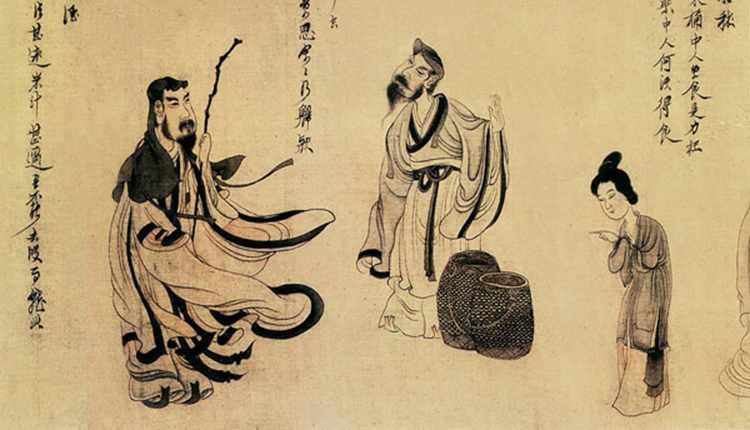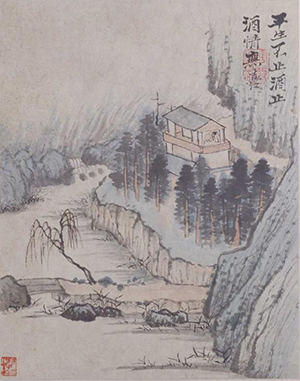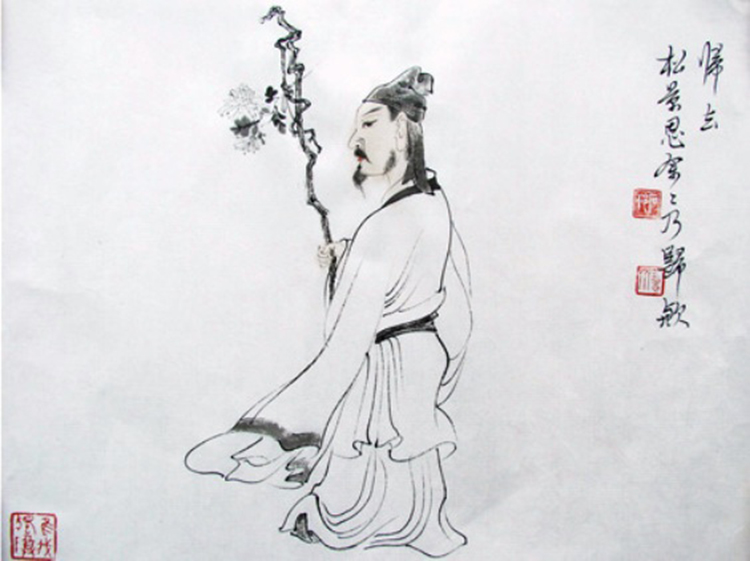Written by: Ye Feng
Posted on: April 21, 2016 | 
Tao Yuanming was one of China's most famous nature poets who abandoned court life to work on his farm (Image by baike)
Tao Yuanming lost his father at the age of nine. Along with his mother and two sisters, he had to take the shelter provided by his grandfather Meng Jia, who was then a famous celebrity with no official post. Meng Jia greatly influenced Tao Yuanming on how to treat people and approach the world, which was particularly reflected in his personality and conduct when he grew up. His grandfather’s huge collection of books provided Tao with ancient classics and histories. In the times of both the Eastern and Western Jin Dynasties, not only did Tao manage to read the works of Lao Zi and Zhuang Zhou like a literati and official, he also learned the teachings of Confucius. Works that were considered “bizarre”, such as myths and legends, were also on his list. Influenced by the age of thoughts and his family, Tao accepted the teachings of both Confucius and Taoism, which resulted in developing quite different aspirations and interests for him.

Withdrawals from his posts to be a recluse
Tao Yuanming was very ambitious while he was still a young man. During the reign of Emperor Xiaowu of the Eastern Jin Dynasty, he cherished “the great aspiration of helping people.” Tao took up the post of Jiangzhong Libationer. At that time, official posts were assigned strictly according to one’s family power. Tao was born a common man and was despised by the bureaucrats, so he resigned and went home. In the fourth year of Long An, during the reign of Emperor An (400 A.D.), he went to Jingzhou and became a follower of General Huang Xuan, who then controlled the middle and lower reaches of the Yangtze River. Later, Tao refused to take part in the general’s conspiracy of usurping the throne. “How should I give that away to the far west,” he wrote a poem to express his regret. A year later, due to his mother’s death, he resigned and went back home again. In 402, Huan Xuan rebelled and took Jian Kang as well as the Emperor’s military and political power. Two years later, Huan Xuan usurped the throne and renamed the regime as ‘Chu’. Tao Yuanming, by then, had become a mere farmer working on his land and sighing in his reclusive yard. “Seldom do people visit my humble yard, seldom do I seem to care for this world. Yet, my concern is unknown, and my doors are always closed,” he wrote, to express that the new king was beneath his notice. But, this didn’t last long. Liu Yu, the prefecture chief of Xiapi, along with He Wuji, and many other officials soon sent a punitive expedition against Huan from Jingkou (now Zhenjiang of Jiangsu Province), joined by Tao who served in the military capacity of Liu Yu’s army.

Plagued by serious corruption, the regime regained its organization after Liu Yu entered Jiankang. “All the officials, in the palace or not, serve the country with respect and responsibility, and the regime regained its order.” When it came to personality, talent, and accomplishment, Liu shared a lot in common with Tao and had once treated Tao with his trust. However, seeing Liu have the entire alien element including the whole family of Diao Kui and Wang Yu and his son killed, Tao fell into despair and in 405 A.D he decided to serve in the military of Liu Jingxuan, General of Jianwei and Prefecture Governor of Jiangzhou. Tao, for another time, followed in the footsteps of his commander when Liu Jingxuan resigned from his post. His uncle Tao Kui introduced him to the post of Pengze country magistrate. But only 81 days after he came to his post he resigned again: this time because he wouldn’t, as he himself put it, “bow like a servant in return for five bushels of grain” when the Inspector of Xunyang County criticized his welcoming dress and manner. The thirteen years of Tao’s political life ended as a county magistrate and with the famous ‘Returning to the Farm,’ he exhibited his decision of not joining the corrupt and the filthy.
His wife Zhai followed him to return to the field. They led a peaceful and a thrifty life, working hard together on their farm. At the beginning, their life was quite easy, but when it came to a year of disaster, they had to “suffer the hunger through nights and days in summer, shiver in bed with piles of sheets covering the winter.” In his later years, the couple faced with serious poverty. Some of his friends helped him financially, and initially he sometimes had to beg for loans at people’s doors. One of his old friends Yan Yanzhi was the county magistrate in the first year of “Jing Ping”, the reign of Emperor Shao (423 A.D.). He would visit Tao every day when he was in Xun Yang and left 20,000 qian. In 424 A.D., Tan Daoji, the prefecture governor of Jiangzhou, visited Tao, who was by then very sick and could not even get up from bed. Tan tried to convince Tao of returning to the political cycle, but Tao insisted. Therefore, he spent his final 22 years as a recluse.
In 427 A.D., Tao Yuanming’s life ended at the age of 63. He was buried at the foot of the South Mountain on the border of the present Jiujiang county and Xingzi county of Jiangxi Province. The tomb had been well preserved. The gravestone is consisted of one giant and two smaller tones with the engraving “Here lies the prominent mister Jing Jie of the Tao’s who was from the conquered land of Jin,” in the middle, the epigraph on its left, and his “Returning to the Farm” on the right. The gravestone was built by the descendants of Tao’s family in the first year of Emperor Qianlong’s Reign in Qing Dynasty.
The first and foremost “Poet of the Fields”
As a poet and prose writer, Tao has deeply influenced Chinese literature. His idyll led Chinese classical poetry into a novel field. In his poems, he combines the descriptions of feelings and emotions, sceneries and sites, and reasons and logics altogether to reconstruct the scenery of the countryside and the living on the farm. His poems are full of artistic charm. The subject matters of his poem can be divided into three categories: those that express feelings and aspirations, those on reasons and philosophy, and the approximately 30 idylls he composed which take up a half of his total compositions. Carrying on the fine traditions of the ancient ‘field’ poetry, Tao not only explored the possibilities of the subject matter of poetry but also made breakthroughs for its thesis and art. He set up his own school in the era filled with metaphysical poems. Directly or not, the poets of the field and their numerous works that emerged after the Sui and Tang Dynasty had all been influenced by Tao.

Composed in the Eastern Jin Dynasty, Tao’s idylls were the product of the social culture of the day. In Wei-Jin dynasties, officials and men of letters lived a decadent life. Down in spirit, they sought consolation from the Taoism of Lao Zi and Zhuang Zhou. Some of them escaped from reality and indulged in leisure, while those who were not content with the society fell into despair. They handed in their black gauze caps and returned home to find shelter on the field. Tao, as one can see, was the extraordinary representative of these recluses.
Tao was raised by the field, which provided him with abundant inspiration for creation. The field also provided him an afterlife within miles. He lived with farmers, and ate and dressed like one. His personal interests and pursuits also affected the way he wrote poems. He was once ambitious and dreamed to conquer and accomplish, yet his wishes never came true. Even though he had once claimed that his withdrawal aimed to support the whole family, it had never been the initial motivation. He returned home because he was frustrated, not because he had put all that behind. Returning to the field was his way of protesting against the reality.
As some literature is produced by bitterness, so are Tao Yuanming’s idylls. The elegance and ease in his words subtly give away the pain in his heart. He had never put the world behind him, and he had never eased his confusion with his resignation and alcohol. That is why contemporary readers should also pay attention to the delicate emotions behind the beautiful and talented lines.
The idylls written by Tao Yuanming are no wonder a treasure of Chinese literature. They formed a significant genre for Chinese classical poetry and achieved great accomplishment in art. Under Tao’s pen, the field as well as the labor work had for the first time gained their own artistic value. The poetic traditions developed by him had been carried on and promoted by many poets of the Tang Dynasty including Wang Wei, Meng Haoran, Chu Guangxi, Wei Yingwu, and Liu Zongyuan. Masters such as Li Po, Bai Juyi, Xin Qiji, and Su Shi had also gained influence from Tao Yuanming.
‘Drinking Wine’ – Tao Qian (translated by Xu Yuanchong)
In people’s haunt I build my cot;
Of wheel’s and hoof’s noise I hear not.
How can it leave on me no trace?
Secluded heart makes secluded place.
I pick fence-side asters at will;
Carefree I see the southern hill.
The mountain air’s fresh day and night;
Together birds go home in flight.
What revelation at this view?
Words would fail if I try to tell you.
You may also like: